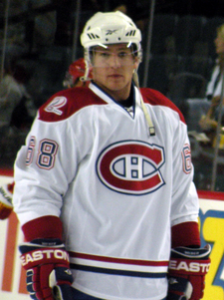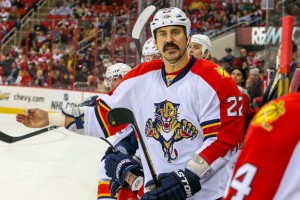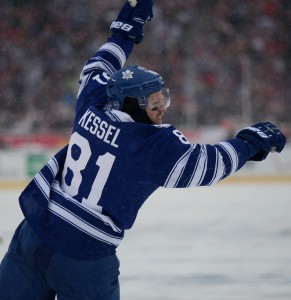When Marc Bergevin landed his first job as an NHL general manager, his Montreal Canadiens team was coming off one of their most disappointing seasons in the 103 year history of the historic franchise.
It was going to take some tough decisions to get this franchise back on track, and Bergevin quickly proved his rookie status was not going to stop him from doing what he thought was best for the future of the team. One of the first decisions he made as the Habs GM was to tell the team’s highest paid player to stay home for the lockout shortened 2013 season, so that he would be healthy enough to be bought out of his lucrative contract at the end of the year.
It’s not like Bergevin was the first to notice that Scott Gomez was not living up to his incredible contract. The former New Jersey Devil who signed a $51.5 million dollar seven year contract with the New York Rangers before being dealt to the Canadiens in 2009, had scored just 21 goals in 196 career games in Montreal, including going more than a calendar year between goals.
However, Bergevin showed that no matter how tough it was to get rid of a player whose production didn’t match his price tag, he would find a way. He did the same thing this past November when he shipped out Travis Moen and Rene Bourque in separate deals that brought in pending UFAs.
Bourque’s $3.33 million dollar cap hit will count against the Columbus Blue Jackets cap next season, while Bryan Allen, who came to Montreal in the deal is now a free agent. Moen has another year left on his contract in Dallas, but Sergei Gonchar is now off the Canadiens cap.
With the Bourque trade and the Moen trade, Marc Bergevin has cleared up about 5 Million in cap space for next year.
— Louis Jean (@LouisJeanMedia) November 20, 2014
What will the Canadiens do with the cap space saved by shipping out Bourque and Moen? Well, if Bergevin’s past three offseasons with Montreal show us anything, the Habs GM will identify an area of weakness, and do whatever it takes to improve that area, no matter how difficult the decisions are along the way.

The mantra surrounding the Montreal Canadiens when they missed the playoffs in 2012, was the team had become too easy to play against. A team that employed undersized forwards David Desharnais, Brian Gionta and Scott Gomez as well as a not so menacing group of defenders led by Tomas Kaberle, Yannick Weber, Chris Campoli and Raphael Diaz, they needed to add some sandpaper to make the Bell Centre a difficult place to visit.
Bergevin accepted that mantra and did what he could to change that culture surrounding the Canadiens. Not only did he waive goodbye to Gomez and his contract that paid him more than seven million per year, he used free agency to bring in the type of players that opponents hate lining up against.
In 2012, Habs Wanted Grit & Bergevin Found Lots Of It
The biggest free agent deal signed by the Habs in Bergevin’s first summer with the club was a $10 million dollar, four year contract to rugged winger Brandon Prust. The 6’0” 195 pound left winger created a reputation for himself during his career with the Calgary Flames and New York Rangers as a player who would block shots, kill penalties, get under the opponent’s skin and hit just about everything that moved on the ice.
Three years into that contract, Prust certainly hasn’t disappointed anyone who thought he would fill that role with the Habs, and this past season he even included opposing goaltenders as opponents he was willing to hit and fight.
https://twitter.com/HockeyWebCast/status/595338490482716673
Colby Armstrong was coming off a disappointing injury riddled season with the Toronto Maple Leafs when he signed with the Habs, but had a similar reputation as Prust. Dating back to his Junior career with the Red Deer Rebels, through his three and a half years in the AHL and into his NHL career with the Pittsburgh Penguins and Atlanta Thrashers, Colby was a rugged winger who hit, fought on occasion and played that rough and tumble style that the Canadiens identified as a huge need.
Francis Bouillon, similarly brought that sandpaper to the lineup that was missing in the 2011-12 season. He played well in that first season back in Montreal, filling a surprisingly physical role for a 5’8” defender. His contrast in style to Kaberle, Weber and Campoli was exactly what the Canadiens were looking for when they signed him.
Whether Bouillon, Armstrong and Prust are front line superstars is not up for debate, but they were the type of players identified as a need by Bergevin heading into that offseason, and he signed all three of them within hours of free agency opening on July 1st, 2012.
Habs Seek Toughness, Bergevin Lands League’s Toughest
The following summer, Montreal was coming off a surprising division title in the regular season, but were basically run out of the rink by the Ottawa Senators in five short postseason games. Though the Habs played well in the series, were decimated by injuries and defeated by an incredible goaltending performance by Craig Anderson, they saw the lack of toughness and a proven playoff performer as major holes to fill.

In hindsight, identifying toughness as a weakness was a foolish move by the organization, but Bergevin acted and got one of the toughest players in the history of the game to come to Montreal, proving when he identifies a need, he pulls no punches in filling that role.
Bergevin sent a 7th round pick and low level prospect Phillippe Lefebvre to the Florida Panthers for enforcer George Parros. If the NHL had a heavyweight championship belt, the 6’5” 224 pound winger would have a permanent mantle for it in his living room. Also signed to add toughness by the Canadiens that summer was 6’3” 245 pound defenseman Douglas Murray.
Whether targeting toughness was the right idea by the organization or not is up for debate, but you couldn’t do any better than to add Murray and Parros if you wanted to win fights in the 2013-14 season.
To add a proven playoff performer, the Canadiens signed Daniel Briere, who had quite an impressive resume. The Gatineau, Quebec center had an incredible 109 points in 108 career playoff games. If you were looking for a proven playoff scorer, you could hardly do better than Briere whose career points per game was among the top 30 all time when he was signed by Montreal.
The 36 year old didn’t have a great regular season in his one year with Montreal, but played well in a reduced role in the playoffs, scoring seven points in 16 games, mostly as the fourth line center.
Bergevin Makes Tough Decisions To Add Mobility On D
Last summer, after making a run to the Eastern Conference Final, the Canadiens finally put a premium on defensemen who can skate and pass the puck, rather than shot blockers who are forgiven for turning the puck over frequently and adding little offensively. The Habs wisely did a 180 degree spin on their belief in toughness from the year previous and allowed Murray and Bouillon to walk, which paved the way for free-wheeling first round pick Nathan Beaulieu to crack the Habs lineup full time.
Bergevin also made the unpopular, but correct decision to trade Josh Gorges to the Buffalo Sabres for a 2nd round pick, and sign Tom Gilbert who is much more adept at moving the puck, and cost $1.1 million dollars less. Bergevin also allowed the team’s captain, Brian Gionta to leave via free agency and signed Jiri Sekac, an offensive minded winger who played the 2013-14 season in the KHL to replace him. He also sent 36 year old Briere to the Colorado Avalanche, receiving P.A. Parenteau, who is as good offensively as Briere while being five years younger as well as a 5th round draft pick in return.
Bergevin's gone from acquiring Briere, Parros and Murray one summer to Parenteau, Gilbert and Malhotra the next. He did some learnin'
— Will (@HeyMyNameIsWill) July 1, 2014
Instead of being comfortable with a team that had a made a strong playoff run, Bergevin made the unpopular choice of having Gorges, Gionta and Briere leave town, and replaced them with younger players who are better skaters and better puck movers.
The offseason is the easiest time of year to make big changes to an NHL team, and Marc Bergevin has shown in three years that he is not scared of making major changes in the summer. He has identified areas of need in each offseason, and has shown an aggressiveness to fill those needs for this team.
Can Bergevin Land An Elite Offensive Player This Summer?
This summer, after Montreal finished 20th in the NHL in goal scoring, struggled to find the net in the playoffs, and had the second worst power play in the postseason, the Habs clearly need to find a way to score more goals next season.

Not all of Bergevin’s moves have made the Canadiens Stanley Cup favorites, and Bergevin’s first two offseasons were spent trying to make this team, tougher, grittier and more difficult to play against. You can argue that this wasn’t the wisest organizational philosophy, but you can’t argue Bergevin’s effectiveness in acquiring the organization’s targets in the past.
Need sandpaper? Who better than Prust? Want toughness? No one is going to outduel Murray and Parros. Want a playoff performer? Briere’s averaged over a point per game in his playoff career. Speed and skill on the blue line? Out goes Murray and Gorges, in come Beaulieu, Gilbert and eventually Jeff Petry. Need a goal scorer?
Well, we can’t answer that question yet, and it is much easier to add toughness and third line grit than it is to add a star offensive player. However, Bergevin has found ways to free up cap space and make difficult and unpopular decisions in the past if he believed it would improve the Montreal Canadiens.
Though it may seem difficult to add a goal scorer like Phil Kessel, Patrick Sharp or Brandon Saad this summer, you can bet once Bergevin sets his sights on a player, he will find a way to reel in his target.